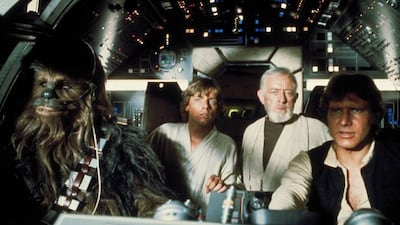Here’s a confession: when I was much younger, I wasn’t a fan of science fiction. I didn’t much like spaceships and ray-guns and alternative universes. What I liked were things that were “real”, that I could imagine happening to me.
So when the first Star Wars movie came out, in 1977, my brother dragged me to the theatre against my will. I sat in my seat, sulking and steaming, until that first astonishing image zoomed by – remember? The underside of a gigantic spacecraft! – and I was hooked.
What I especially liked about the picture were the robots. The two robots – one gleaming gold and the other a squat little fire hydrant on wheels – seemed especially inspired.
I saw that movie about a dozen times in the cinema. When the sequel, The Empire Strikes Back, came out, I stood in line for the first showing at the Northpoint Cinema in San Francisco, carefully watching the crowd. There was a rumour that George Lucas himself was going to swing by and work the crowd. My plan was to sidle up to the billionaire filmmaker and ask him a question.
In the original movie, as Luke Skywalker is zooming towards the Death Star, he impulsively switches off his robot-assisted flight computer. He turns off his technology and flies by instinct and intuition and something called “The Force”. It’s a great moment and – spoiler alert! – it’s the right choice for Luke to make. It’s The Force that allows him to destroy the Death Star and crush the Empire.
But what I wanted to ask George Lucas was this: if these outer space beings could invent things like spaceships and Death Stars and light sabres, wouldn’t they also be able to automate and robotically re-create The Force itself? These were highly sophisticated beings, after all. Surely they could have come up with something along the lines of what’s in the latest BMWs – a technical thingy that parks the car for you. Or Siri, the irritating voice inside the iPhone that “listens” to your queries. Can’t human intuition be replicated?
What I was thinking about, I suppose, was what we now call Artificial Intelligence, the process by which a machine gets smarter and smarter until it can successfully mimic, and ultimately surpass, human intelligence. In later films like The Matrix and The Terminator, this process is described in apocalyptic tones – machines become “self aware” and turn on their human masters, plunging the earth into a dark and toxic time. Back in 1979, it never occurred to me that the adorable robots of George Lucas’s imagination could ever evolve into anything but delightful and friendly creatures.
If you listen to Elon Musk, the mad inventor billionaire behind such things as PayPal and SpaceX rockets, the world is rapidly approaching its artificial intelligence moment, and that isn’t good news. He’s been telling anyone who will listen – and it turns out that if you have a couple billion dollars, there are lots of folks who will listen to you – that the age of smart machines is imminent and that these machines will eventually rule us.
He is saying, essentially, that the world is going to look a lot more The Terminator and a lot less Star Wars in the future.
Notice, though, that in describing the future we always seem to use movies as our touchstones. The coming centuries are either Star Wars or The Matrix or Mad Max or something worse. And yet the track record for predictions coming out of Hollywood is pretty awful. One of the earliest science fiction pictures ever, 1930s Just Imagine, depicted life in New York City 50 years hence. According to that movie, by 1980 all New York citizens would fly through the air in mini zeppelins and have numbers instead of proper names. It’s 2015, and we’re still having trouble hailing taxis in the rain.
And that’s the good thing about the future: it takes its time coming, and even when it comes it’s never as bad as you thought.
Years ago, when television broadcasting technology became lighter and more compact – it no longer required enormously large cameras and coils of heavy cable to record and broadcast a television show – television networks and studios found that they couldn’t shed the legions of camera operators and crewmen they had been paying. Union contracts were ironclad: a television broadcast required a certain number of personnel.
Even today, on any major television broadcast, there will be a room somewhere with a table and some snacks and several guys sitting around it, hanging out, chatting, making jokes, reading the newspaper, doing essentially nothing. They’re not working but, thanks to generous union contracts, they are getting paid. The future has grown up around them. Hollywood can spin a tale about the future – both the good kind and the bad kind – but it cannot force it to happen. Something tells me that even if a future like The Matrix came true, eventually there would be a room with a table and some snacks and some evil robots sitting around it that cannot be fired.
Rob Long is a writer and producer based in Hollywood
On Twitter: @rcbl

